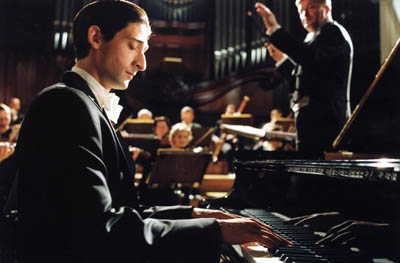| The Pianist |  |
|
In a scene near the middle of Roman Polanski's Palme d'Or-winning 'The Pianist', seven men are selected at random from a line-up of Jews and forced to lie face-down in the mud. A German soldier moves rapidly along the row of prone men, shooting them one after the other through the head. When the soldier has finished off the first six, his clip is empty; in a pause of five or so seconds that feels like a lifetime, the soldier carefully reloads his pistol, and then fires his seventh bullet... This scene reflects a horrible truth about the fate of Jews under the Nazis: death was completely arbitrary and undiscriminating, and reprieves from it were as rare as they were fleeting. 'The Pianist' is unflinching in its depiction of death coming to all Jews - rich and poor, young and old, male and female, brave and cowardly. All attempts to resist, including the 28 day Warsaw Ghetto Uprising of 1943, are shown to prove futile against the Nazis' determined programme of extermination. Yet 'The Pianist' is a tale of survival, based on the personal account of Jewish pianist Wladyslaw Szpilman, who stayed in Warsaw throughout the Second World War, miraculously escaping the many forms of death which confronted him there while all else around him fell. At the film's 1939 beginning, Szpilman performs a piano recital for Polish radio which is interrupted when the building is bombed. Later, when he is forced to move to the Ghetto, he is able to continue playing for a Jewish restaurant, but again, each performance depicted in the film is interrupted. Later still, when he is holed up alone for months in a locked room, he cannot play the piano there for fear that the sound will draw attention to his presence, and so must resort pathetically to 'playing' the air, with his fingers suspended inches above the actual keyboard. All this dramatises the loss of identity and humanity suffered by the Jews at the hands of the Nazis. By surviving, Szpilman is able to regain his former identity and play classical piano again. Most others were less fortunate. The experiences of Szpilman (played with convincing naturalism by Adrien Brody) offer no comfortable Hollywood narrative: it is not heroism or talent which saves Szpilman, but rather incredible luck and the occasional kindness of others. There is no special dignity, honour or justice in Szpilman's survival - all that singles him out from the tens of thousands of Jewish dead in Warsaw is the bare fact that he is still alive, and can give a testimony of their fate. If I have any criticism of the film at all, it is of a sequence in the final fifteen minutes. Just before the German retreat from Warsaw, a Nazi Captain (Wilm Hosenfeld, played by Thomas Kretschmann) hears Szpilman play, and then unexpectedly decides to help him. This is unquestionably an extraordinary episode, and one of the most moving in the film. Yet Polanski overplays the similarity of Hosenfeld's background to Szpilman's, showing a family photo from happier times that sits on Hosenfeld's desk in Nazi Headquarters. This image, for all its sentimentality, strikes a jarring note, as it is one of the only things shown in the entire film which Szpilman could not possibly have witnessed himself. It is a pity to taint Szpilman's personal testimony with so glaring a piece of fiction. This criticism aside, 'The Pianist' is a difficult but important film, made with unobtrusive art. Anton Bitel, 14.01.03 |
|